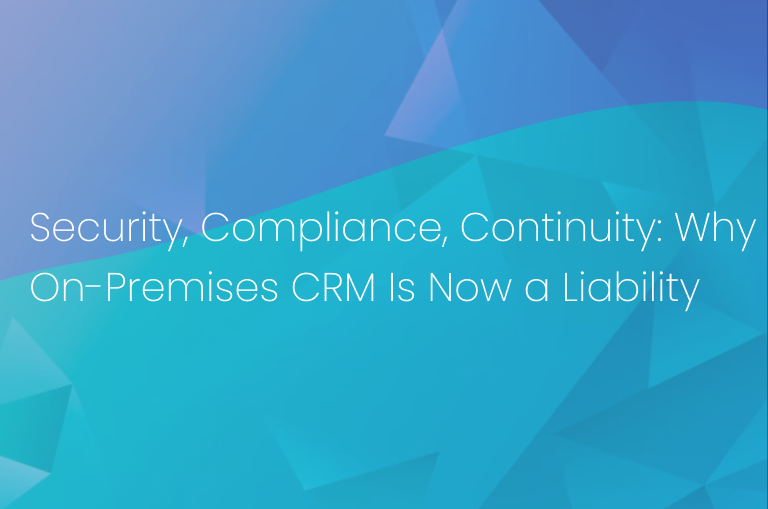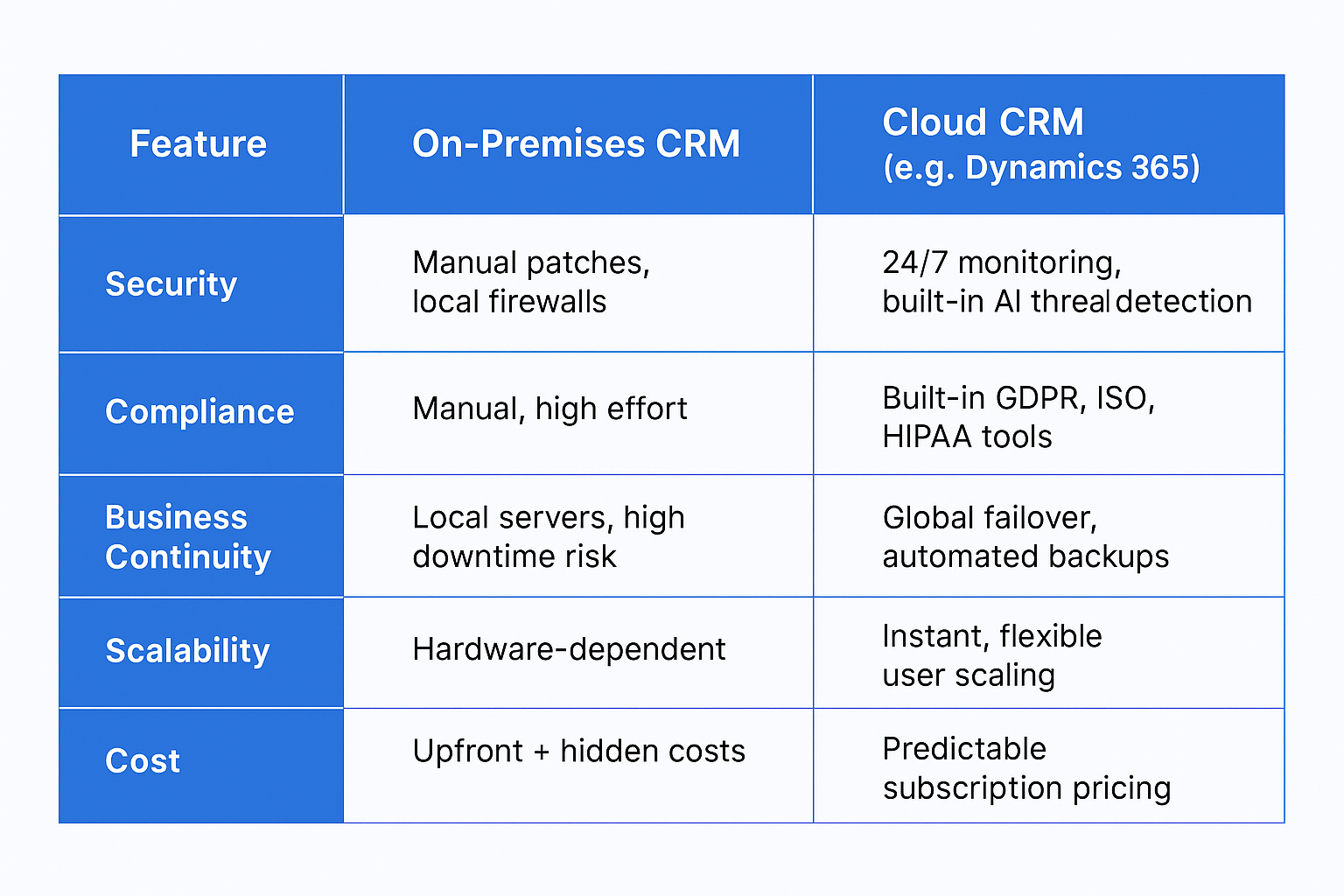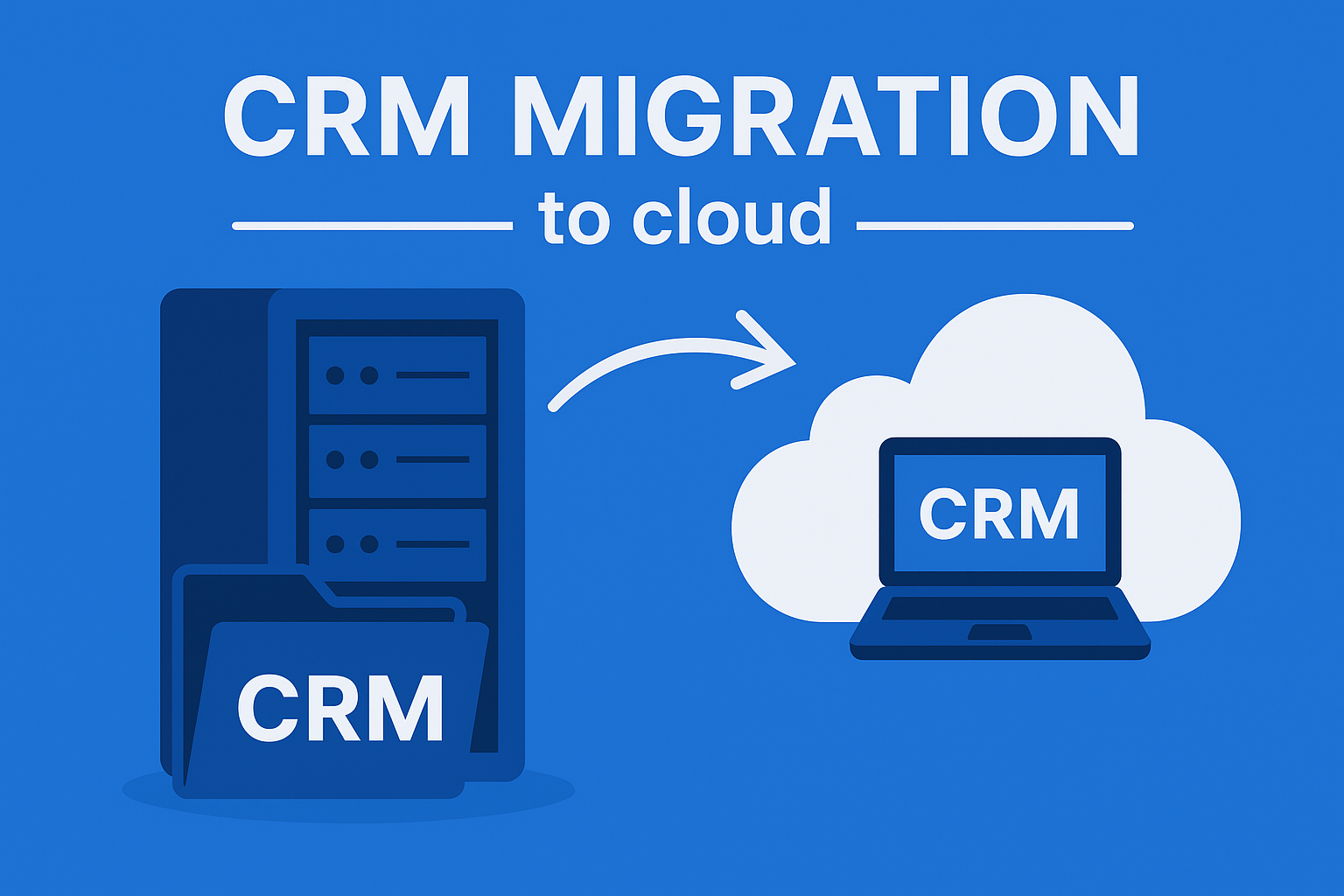Security, Compliance, Continuity: Why On-Premises CRM Is Now a Liability

For years, on-premises CRM systems served businesses well. They provided control, predictability, and the comfort of knowing that all customer data lived under the company’s roof. But that control now comes at a steep cost financially and operationally. What once felt like a safe, tailored solution has become a serious liability in three critical areas: security, compliance, and continuity.
Security: An Unfair Fight
Cyberattacks are not slowing down; they’re growing more targeted and sophisticated. In 2023 alone, ransomware attacks increased by over 37%, with small and mid-sized enterprises becoming increasingly frequent victims. This isn't just a risk for businesses still running on-premises CRM systems; it’s a vulnerability.
Unlike cloud solutions like Microsoft Dynamics 365, which benefit from global-scale security infrastructure, on-premises CRMs rely heavily on internal IT teams to stay up-to-date with patches, firewalls, access control, and monitoring. Even the most talented in-house teams rarely have the capacity or budget to match the constant innovation and vigilance required to secure a system 24/7.
With cloud-based CRM, security is not an afterthought. Microsoft, for example, invests over $1 billion annually in cybersecurity, including AI-powered threat detection and automated updates that resolve vulnerabilities before they’re exploited. These protections can realistically replicate no on-prem deployment.

Compliance: The Hidden Time Bomb
Another growing challenge is keeping pace with evolving regulatory requirements. From GDPR to ISO 27001 to HIPAA, businesses are increasingly subject to strict data handling rules. One misstep, such as failing to encrypt customer data at rest or not maintaining proper audit trails, can lead to severe financial penalties and reputational damage.
On-premises CRM systems often lack built-in tools to handle these requirements. In these cases, compliance becomes a manual effort, reliant on human processes, custom scripts, or expensive third-party add-ons. It’s labour-intensive, error-prone, and unsustainable in the long run.
Cloud CRM platforms, by contrast, are designed with compliance in mind. Dynamics 365, for instance, offers built-in features like data loss prevention policies, audit logs, role-based access control, and automatic data retention compliance across multiple global standards. These capabilities are more reliable and make audits easier and less stressful.
Continuity: Business Can't Afford Downtime
Every minute of downtime costs money, productivity, and most importantly, customer trust. Whether it’s hardware failure, power outages, or software crashes, on-prem systems are inherently more vulnerable to disruption.
Most on-premises CRM deployments lack high-availability infrastructure or geographically redundant backups. They often depend on a single data centre or server room. In a significant disruption, such as a natural disaster, cyberattack, or even accidental deletion, recovery can take hours or even days.
By contrast, cloud CRM platforms are designed for resilience. Microsoft’s Azure infrastructure provides automatic failover, real-time backups, and disaster recovery capabilities that ensure minimal downtime. Cloud-based systems keep your data accessible, no matter what happens in your office or server room.
The Hidden Costs of Staying On-Prem
Some businesses delay migrating to the cloud out of concern over subscription costs or fear of disrupting their operations. But the real cost is often in staying put.
-
Maintenance and upgrades: On-prem CRM requires ongoing hardware investments, manual patching, and frequent downtime for upgrades.
-
Scalability challenges: Need to onboard 50 new users? That means provisioning hardware, adjusting licenses, and possibly overhauling configurations. Cloud CRM scales in minutes, not weeks.
-
Talent drain: IT professionals increasingly prefer to work on cloud-native technologies. Maintaining legacy systems often means depending on increasingly scarce expertise.
What looks cheaper on paper quickly becomes more expensive in practice.
Migrating Doesn’t Have to Be Disruptive
Migration can sound like a massive undertaking, especially if your CRM is deeply tied to other business processes. But it doesn’t have to be. With the right partner, migration to Dynamics 365 or another cloud-based CRM can be executed smoothly, with minimal interruption to your daily operations.
Our team specialises in end-to-end CRM migration services from assessing your current on-prem system to securely transferring data, configuring the new cloud environment, and training your users. We understand that every business is different, so we offer tailored migration roadmaps aligned with your goals, timelines, and budget.
We also offer support post-migration, ensuring your team is confident and your new system is optimised for long-term success.

A Smarter Way Forward
Security threats will only increase. Regulatory frameworks will continue to tighten. And customer expectations for always-on, seamless support will keep rising. An on-premises CRM might once have given you control, but today it puts your business at risk in no longer acceptable or necessary ways.
Migrating to a cloud-based CRM like Microsoft Dynamics 365 isn’t just an IT decision. It’s a strategic investment in security, compliance, and resilience. It’s a way to future-proof your business, safeguard your customers, and free your team to focus on what matters most: delivering excellent service.
Let us help you make the transition. Contact us today to schedule a free CRM migration consultation.

